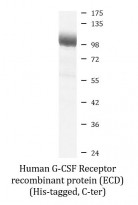ARG70289
Human G-CSF Receptor recombinant protein (Active) (His-tagged, C-ter)
Human G-CSF Receptor recombinant protein (Active) (His-tagged, C-ter) for Functional study,SDS-PAGE and Human
Overview
| Product Description | HEK293 expressed, His-tagged (C-ter) Active Human G-CSF Receptor recombinant protein. |
|---|---|
| Tested Reactivity | Hu |
| Tested Application | FuncSt, SDS-PAGE |
| Target Name | G-CSF Receptor |
| Species | Human |
| A.A. Sequence | Glu25 - Pro621 of Human G - CSF Receptor (NP_000751.1) with 6X His tag at the C - terminus. |
| Expression System | HEK293 |
| Activity | Active |
| Activity Note | Measured by its ability to inhibit the GCSF-induced proliferation of M-NFS-60 mouse myelogenous leukemia lymphoblast cells. The ED50 for this ettect is typically 31.5-126 ng/ml. |
| Alternate Names | G-CSF receptor; CD114; CD antigen CD114; G-CSF-R; GCSFR; Granulocyte colony-stimulating factor receptor |
Properties
| Form | Powder |
|---|---|
| Purification Note | 0.22 µm filter sterilized. Endotoxin level is <0.1 EU/µg of the protein, as determined by the LAL test. |
| Purity | > 95% (by SDS-PAGE) |
| Buffer | PBS (pH 7.4) |
| Reconstitution | Reconstitute to a concentration of 0.1 - 0.5 mg/ml in sterile distilled water. |
| Storage Instruction | For long term, lyophilized protein should be stored at -20°C or -80°C. After reconstitution, aliquot and store at -20°C for up to one month, at 2-8°C for up to one week. Storage in frost free freezers is not recommended. Avoid repeated freeze/thaw cycles. Suggest spin the vial prior to opening. |
| Note | For laboratory research only, not for drug, diagnostic or other use. |
Bioinformation
| Gene Symbol | CSF3R |
|---|---|
| Gene Full Name | colony stimulating factor 3 receptor (granulocyte) |
| Background | The protein encoded by this gene is the receptor for colony stimulating factor 3, a cytokine that controls the production, differentiation, and function of granulocytes. The encoded protein, which is a member of the family of cytokine receptors, may also function in some cell surface adhesion or recognition processes. Alternatively spliced transcript variants have been described. Mutations in this gene are a cause of Kostmann syndrome, also known as severe congenital neutropenia. [provided by RefSeq, Aug 2010] |
| Function | Receptor for granulocyte colony-stimulating factor (CSF3), essential for granulocytic maturation. Plays a crucial role in the proliferation, differientation and survival of cells along the neutrophilic lineage. In addition it may function in some adhesion or recognition events at the cell surface. [UniProt] |
| Cellular Localization | Isoform 2: Secreted. Cell membrane; Single-pass type I membrane protein. [UniProt] |
| Calculated MW | 92 kDa |
| PTM | N-glycosylated. [UniProt] |
Images (1) Click the Picture to Zoom In






